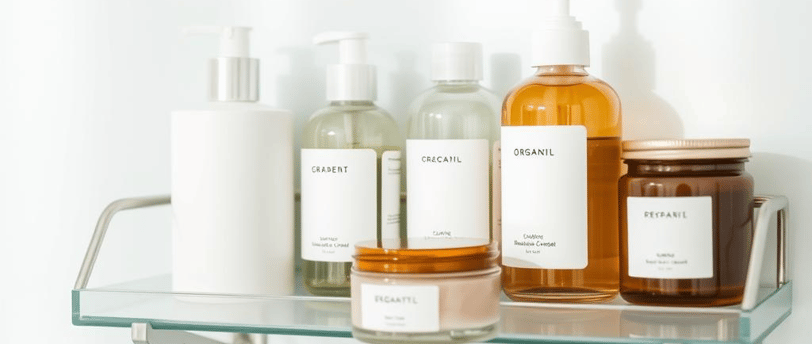Reduce Toxin Exposure to Balance Hormones: Embrace Natural Skincare, Avoid Plastic Containers, and Choose Organic Foods When Possible
🧘WELLNESS TIPS🌸 HORMONAL BALANCE & WOMEN’S WELLNESS


In today's fast-paced world, our bodies are continually bombarded by a plethora of chemicals and toxins that can disrupt our hormonal balance. From everyday household products to processed foods, these substances not only impact our health but can also lead to long-term consequences. However, scientific evidence suggests that making conscious choices, such as opting for natural skincare products, steering clear of plastic containers, and choosing organic foods whenever possible, can significantly reduce toxin exposure and help restore hormonal equilibrium. In this article, we will delve into these strategies, exploring the scientific basis behind them and providing practical tips for implementation.
Understanding Hormonal Disruption
Hormones serve as crucial messengers in our bodies, regulating numerous biological processes including metabolism, mood, reproductive health, and immune function. Disruption in hormone levels can lead to a myriad of health issues such as weight gain, mood swings, infertility, and increased risk of chronic diseases.
Scientific literature has documented an array of synthetic chemicals known as endocrine disruptors, which interfere with hormone functioning. These disruptors can mimic, block, or modify hormone levels, leading to imbalance. Common sources include plastic compounds like bisphenol A (BPA) and phthalates, parabens found in personal care products, and pesticides used in conventional agriculture.
The Role of Natural Skincare
One of the primary ways we can unintentionally expose ourselves to harmful toxins is through skincare and personal care products. Many conventional products contain synthetic ingredients that can act as endocrine disruptors. For instance, parabens are widely used as preservatives in cosmetics but have been linked to hormonal imbalances.
Choosing Natural Alternatives:
Opting for natural skincare products, which typically rely on plant-based ingredients without synthetic chemicals, can reduce the toxic burden on your body. Ingredients like shea butter, coconut oil, and essential oils provide moisturizing benefits without the harmful side effects associated with many conventional products.
When selecting skincare products, consider the following tips:
Read Labels Carefully: Look for products that are labeled as "paraben-free," "phthalate-free," and "fragrance-free."
Research Brands: Support companies that prioritize transparency about their ingredients and manufacturing processes.
DIY Skincare: Many natural skincare products can be made at home using simple ingredients like honey, olive oil, and herbal infusions.
Avoiding Plastic Containers
Plastic containers are prevalent in our everyday lives, but they are also a significant source of chemical leaching into food and beverages. BPA and phthalates, commonly found in plastics, have been shown to disrupt sexual and reproductive health and have been implicated in obesity and diabetes.
Making Safer Choices:
Opt for Glass, Stainless Steel, or Wood: When possible, store food in glass containers, stainless steel, or wooden alternatives. This minimal step can significantly decrease your exposure to harmful chemicals.
Avoid Heating Plastic: Heat can cause plastics to break down, releasing more toxins into your food. Always transfer food to a glass or ceramic container when reheating.
Be Mindful of Packaging: Choose products that are packaged in glass or cardboard rather than plastic. This applies not only to food but also to beverages and cleaning supplies.
Choosing Organic Foods
Agricultural practices have evolved over decades, but the use of synthetic pesticides and fertilizers remains prevalent in conventional farming. These chemicals have been shown to have endocrine-disrupting properties. By choosing organic foods, consumers can drastically reduce their exposure to these harmful substances.
Benefits of Organic Foods:
Reduced Chemical Exposure: Organic farming prohibits the use of synthetic pesticides, providing a cleaner food source.
Better Nutrient Profiles: Some studies suggest that organic fruits and vegetables have higher antioxidant content, which can support overall health and hormone balance.
Supports Biodiversity: Organic farming practices are generally more sustainable, promoting biodiversity and ensuring healthier ecosystems.
To incorporate organic foods into your diet, consider the following strategies:
Prioritize the Dirty Dozen: The EWG (Environmental Working Group) publishes an annual list of fruits and vegetables that are most affected by pesticides. Focus on buying these items organic whenever possible.
Shop Local: Explore farmers' markets where you can often find local organic produce. This not only reduces toxin exposure but also supports local economies.
Grow Your Own: If possible, consider starting a small garden. Growing your own fruits and vegetables can be a rewarding way to ensure you are consuming pesticide-free food.
Lifestyle Adjustments to Support Hormonal Balance
Reducing toxin exposure is a significant step, but it should be part of a broader strategy for maintaining hormonal health. Other lifestyle adjustments can support hormonal balance, including:
Regular Exercise: Physical activity can improve insulin sensitivity, reduce stress, and promote hormone balance.
Mindful Eating: Pay attention to your body's hunger and fullness cues, and focus on incorporating whole, minimally processed foods into your diet.
Stress Management: Chronic stress can lead to hormonal imbalances. Practices such as meditation, yoga, or even leisurely walks can significantly improve mental and emotional well-being.
Conclusion
Balancing hormones is critical for overall health, and reducing toxin exposure is a significant step in that direction. By embracing natural skincare, avoiding plastic containers, and opting for organic foods, individuals can take charge of their health and well-being. Scientific evidence supports these practices, highlighting their efficacy in reducing exposure to harmful endocrine disruptors.
In a world filled with industrial products and processed foods, making these mindful choices can empower you to lead a healthier, balanced life. Start today by assessing your personal care products, kitchenware, and grocery selections; your body will thank you for it in the long term.
